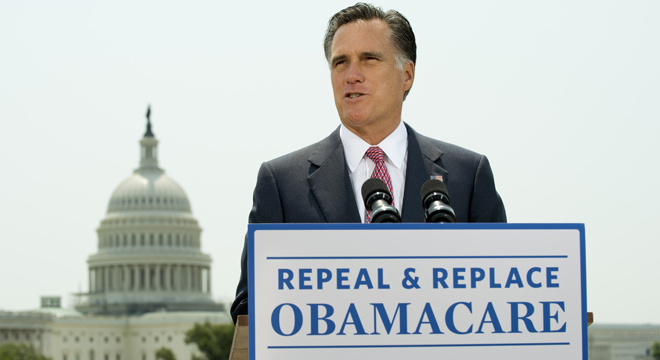When Mitt Romney’s pledge to repeal the Affordable Care Act drew jeers from the audience at the NAACP convention on Wednesday, the presumptive Republican nominee defended his remarks with an old stand-by — a survey he has trotted out on the campaign trail numerous times.
“You know, there was a survey of the Chamber of Commerce,” Romney said as the boos subsided. “They carried out a survey of their members, about 1,500 surveyed, and uh, they asked them what effect ‘Obamacare’ would have on their plans, and three-quarters of them said it made them less likely to hire people.”
It was hardly the first time Romney went to that well to justify one of his most ubiquitous campaign promises. But that survey — often Romney’s central piece of evidence to prove “Obamacare” is a job-killer — has some glaring flaws.
Consider The Source
The U.S. Chamber of Commerce has led the charge against the Affordable Care Act. The right-leaning lobbying group supports repeal of the law and has filed 28 comments to “highlight the operational problems and unintended consequences of the rapidly drafted, flawed regulations” of the health care overhaul. In May, the group announced an ad blitz in 17 congressional districts and four Senate races targeting members who voted for the 2010 health care law.
Flawed Methodology
Plenty of partisan groups release legitimate, reputable surveys, but this isn’t one of them. The “Small Business Outlook Study” was conducted online on March 27-April 2 by Harris Interactive, a research firm based in New York that is traded on NASDAQ. Many polling experts are wary of internet-based surveys (PollTracker does not include any in its averages) because of their susceptibility to manipulation and the inherent flaws in drawing a sample from an online audience.
Moreover, the Chamber of Commerce even qualified its findings in a corresponding press release with an acknowledgement that the survey was “not based on a probability sample and therefore no estimate of theoretical sampling error can be calculated.” As Fact Check noted, that amounts to an admission that its survey doesn’t definitively include a representative sample of small business owners.
Who Participated In The Survey?
The Chamber of Commerce and Harris did try to achieve a balanced sample. Contrary to what Romney suggested to the audience at the NAACP convention, the survey was not limited exclusively to Chamber of Commerce members.
Among the 1,339 small business executives who participated in the survey, 536 were members, and 803 were not — seemingly a good-faith effort to ensure that the survey’s participants were representative of the small-business community. Ostensibly, this was also done to avoid a sample overtly biased toward the Chamber of Commerce’s cause.
But consider this nugget from the survey: A whopping 94 percent “cite the Chamber’s voter education efforts as important.” Given that many of those “voter education efforts” have included a steady drumbeat of criticism toward the Affordable Care Act, it’s unsurprising that the same survey found an overwhelming majority disillusioned with the law.
The Chamber of Commerce did not immediately respond to TPM’s request for comment.






